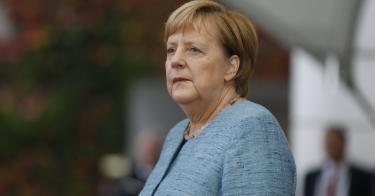German Chancellor Angela Merkel’s decision to surrender her leadership of the Christian Democratic Union is a surprise, though not a shock. The causes of her departure reveal the folly of the course that Germany followed under her leadership.
Stepping down as leader of her party doesn’t deprive Merkel of her day job of leading Germany. She plans to stay on as chancellor until the next federal election in October 2021. But virtually everyone sees this as the beginning of the end.
In 2004, her predecessor as chancellor, the noxious Gerhard Schröder — who works for Vladimir Putin’s oil company, Rosneft — tried to cling on to power by giving up his party leadership. By the next year, he was out. At the time, Merkel mocked him for the effort.
Now the mockery is directed at Merkel. But it should be no shock when a politician who has led her party for 18 years, and her nation for 13, starts to hang it up. As General Charles de Gaulle purportedly quipped, “The graveyards are full of indispensable men.”
But even if an end is inevitable, the whys of it matter. Merkel is under pressure because of bad election results. Two weeks ago in Bavaria, the CDU’s sister party did poorly. Last weekend, the CDU won barely a quarter of the vote in the state of Hessen. It was a regional result, but also a vote against the national government.
But the CDU’s problems run deeper than poor electoral performance. In 2017, the CDU and its left-wing coalition partner, the Social Democratic Party, lost dozens of seats to the Alternative for Germany. The losses continued in Hessen, where Alternative for Germany and the Greens won big.
What is happening in Germany is not that different from what has happened in Norway or France. Everywhere, established parties — always on the left, and often on the right — are losing votes to so-called populists. European voters are more willing than ever to punish the political mainstream.
In Merkel’s case, the reason for that is obvious, and acknowledged by all: her 2015 decision, taken without apparent thought of the consequences, to welcome as many Middle Eastern migrants as could make it into Germany. In the end, more than 1.1 million arrived in 2015 alone.
Election results across Europe show that the public now believes this was a terrible idea. Before the Hessen election, Merkel said that everyone should just stop talking about 2015. “I demand that we now focus on the future,” she said. It sounded like King Canute trying to command the tides.
If Merkel was merely Merkel, though, her departure would not be treated as a bellwether. Her real significance is that she is the uncrowned Queen of Europe, often lauded as the last true European, surrounded on all sides by populists, nationalists, and Euroskeptics.
The irony is, though, that no one has done more to bring down the Europe that Merkel purportedly embodies than Merkel herself. Her migrant policy left voters with the impression that she cared more about Syrians than Germans, while her vehement defense of the euro — a currency that suits Germany much better than it suits anyone else — only exacerbated southern Europe’s unemployment problem.
The problem is this: Europeans do not want the policies that would create the kind of politically united Europe that Merkel supposedly represents. If Europe has a common migration policy, for example, it will inevitably be made primarily in Berlin and Brussels. That is not unification: it is domination.
Merkel’s significance is that, for a time, she was able to conceal this reality behind a motherly image. But in the end, by acting as Europe’s queen, she destroyed both her power at home and her European throne.
Europe has no queen. Nor does it want one.
This piece originally appeared in Newsday



